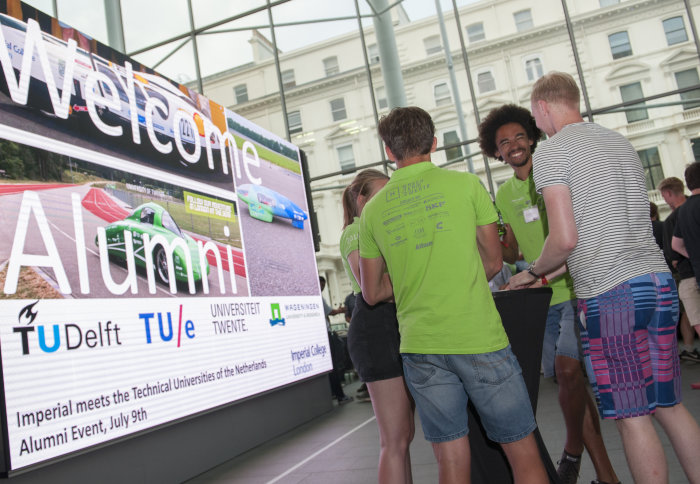Dutch universities accelerate Imperial collaborations

Students, alumni and academics the Netherlands’ top technical universities met with their Imperial peers to grow collaborations this week.
A delegation from 4.TU, an alliance of the universities of Delft, Eindhoven, Twente and Wageningen, including student Racing Green teams, held a joint event with Imperial on the fringe of the Shell Eco-marathon.
Students from Imperial, Delft, Eindhoven, Twente held a joint technical workshop with their Racing Green teams. Racing Green helps undergraduate students to design, make, test and race zero emission vehicles.

The four Dutch technical universities also held a joint alumni reception to celebrate collaboration between themselves and with Imperial, as well as to mark the achievements of the student teams in the Shell Eco-marathon.

The event was supported by the Dutch Embassy. The Netherlands’ Deputy Ambassador Brechje Schwachofer said she was “Delighted to celebrate this collaboration on future mobility and energy efficiency with our close North Sea neighbours.”
Zero emission ambition
Ms Schwachofer spoke of the Dutch government’s aim for all new cars to be zero-emissions vehicles by 2030.
She added: “No border or stretch of water can contain common grand challenges we face like climate change… Both governments have made commitments to reduce greenhouse gases and I hope we can provide ample opportunities for our leading universities of science and technology to collaborate on areas like electric and autonomous vehicles”

Imperial’s Vice President (Innovation) Professor David Gann spoke of his excitement at Imperial’s growing links with the Dutch technical universities and Shell: “Imperial cherishes these European collaborations and are working hard and investing to ensure they grow.”
“We publish over 1000 papers per year with Dutch partners and have over 90 active European projects with the four technical universities covering a range of science and innovation,” he added.
Racing Green pride
Roger Cracknell, a technology expert in combustion chemistry at Shell Global Solutions, said Shell is “Proud to support the Racing Green event to inspire young people to be leaders of tomorrow in designing, driving and building ultra-efficient vehicles. They have the challenge of turning visions of sustainable transport into reality.”
Mr Cracknell explained that the Eco-marathon concept began in 1939 as a wager between Shell employees over who could get their vehicle to go furthers on a gallon of fuel. Today, 5,000 people compete all over the world using a variety of technologies, including hydrogen, fuel cell and electric batteries. Next year, Shell will launch an autonomous vehicle category.
 Imperial Racing Green team principal Laura Cattaneo, a student in Mechanical Engineering, spoke of the team’s experience racing in the Olympic Park: “It has been wonderful to work with students from a range of different disciplines, including EEE, Mechanical, Aeronautical and Design
Imperial Racing Green team principal Laura Cattaneo, a student in Mechanical Engineering, spoke of the team’s experience racing in the Olympic Park: “It has been wonderful to work with students from a range of different disciplines, including EEE, Mechanical, Aeronautical and Design  Engineering, Materials and Applied Physics, as well as from many different nationalities… This is a great platform to build new scientific networks and reflect on the intense experience of supporting each other in the pit lanes of the Olympic park track on one of the hottest days of the year.”
Engineering, Materials and Applied Physics, as well as from many different nationalities… This is a great platform to build new scientific networks and reflect on the intense experience of supporting each other in the pit lanes of the Olympic park track on one of the hottest days of the year.”
The University of Twente’s Racing Green team leader Luc Djozin-Kemadjou said: “Our team won the off-track award for communication. This was focused on our advocacy for hydrogen and fuel cells as a key component of the energy mix which will power sustainable transport in the future. This is important to inspire young engineers to work on new technologies like hydrogen.”
Article text (excluding photos or graphics) © Imperial College London.
Photos and graphics subject to third party copyright used with permission or © Imperial College London.
Reporter
Andrew Scheuber
Communications Division